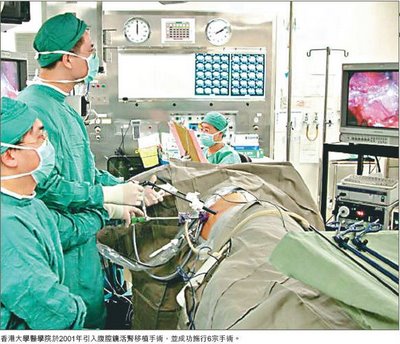Renal failure (腎衰竭)

 The doctors are performing kidney transplantation by endoscopy.
The doctors are performing kidney transplantation by endoscopy.Renal failure are classified into chronic and acute. Chronic renal failure is irreversible (over 75% of kidney cells are damaged). It is caused by vascular diseases, obstruction of urine outflow, recurrent infection of kidney and hypersensitive reaction.
Renal failure causes various problem like
1. waste production retention:
- As glomerulus filtration is decreased, less urea is excreted. Thus more urea is retented in blood. High concentration of urea then leads to high concentration of urea in glomerulus filtration. As urea is osmotic reactive, more water is drawn into the renal tubules which may cause hypotension.
- At the same time, K+ excretion is not enough. High concentration of potassium depresses nervous system causing muscle weekness and fatigue
- Retention of PO4= causing inhibition of enzyme for activating vitamin-D which in turn lowers the Calcium absorption in the gut. Bone pain and weakness occur.
2. Inability to control the osmolarity of extracellular volume (inability to control Na+)
-polyurea
-isothenmia
-nocturia (urination at night)
3. Inability to control blood pressure
when sodium intake is more than our bodies require, hypertension occurs.
When sodium intake is insufficient, hypotension occurs.
4. Effect on blood components
uremia affects platelet functions which leads to defective clotting
decrease in erythropoietin production and thus lowers the red blood cells count leading to anaemia
5. Loss of useful substacnce
NaCl, glucose, proteins, HCO3- due to inadequate reabsortion
6. Loss of HCO3-
H2CO3- acts as a buffer in our bodies, insufficient reabsortion casues metabolic acidosis.
Respiratory compensation is acticated to eliminate CO2 in blood.
7. Compensatory hypertrophy
Treatments:
dialysis, kidney transplant, antibiotics for infection, removal of obstruction, sodium bicarbonate intake for acidosis, blood transfusion for anaemia
Acute renal failure is reversible. (urine out is inadequate to eliminate waste product in body, <0.5L/day)



0 Comments:
Post a Comment
<< Home